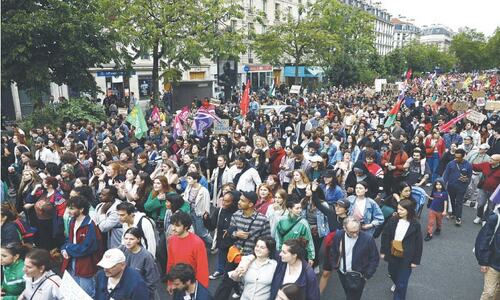HAMILTON (Bermuda): In a rare collective pause for reflection, the people of this prosperous mid-Atlantic island are debating whether they want to bust their own boom. The envy of most nations, with per capita income of $36,000 and 13,000 offshore businesses spending $1.5 billion a year, Bermuda’s 65,000 people are facing the possibility — some call it a threat — of becoming another Hong Kong.
Rents and living expenses here already rival those in Hong Kong, a former British colony that reverted to China six years ago. Single-family homes and low-rise public buildings remain the rule, but developers are pushing a raft of multi-story apartment, condominium and office complexes.
The median house price is almost $1.3 million.
“There’s been a tremendous loss of open space and people have to decide now, does it make sense to focus development in Hamilton and go high-rise?” said Ross Andrews, who was sent by Britain to coordinate a sustainable development project for the island, which is a British overseas territory.
“If Bermuda wants to be Manhattan in the sea, that can be done, as long as Bermudians recognize the trade-offs,” he said.
The arrival last year of the island’s first condos and increasing strains on water, power and waste management have spurred a virtual building freeze while Bermudians decide how much more growth the 21-square-mile island can withstand.
Town hall-style meetings are being conducted to poll communities, and a statistical profile and questionnaire have been delivered to all 25,000 households.
The profile offers a sobering look at what has happened to this once-bucolic island:
— Bermuda is one of the world’s most densely populated territories, with an average of about 3,100 people per square mile.
— Water use that was seven gallons daily per person in the 1960s is 30 gallons each now and rising.
— The volume of per capita waste exceeds that of New York.
— There are 46,000 vehicles today, about 20 per cent of which arrived in the last five years.
“Finally, the government is looking at the island and deciding, ‘Oh boy, we’re really having digestive problems. We’re so overcrowded we’re busting at the seams,’” said Erin Moran, a founding member of the Greenrock environmental group lobbying for moderation.
Until Hurricane Franklin grazed the island last month and refilled residential cisterns, Bermuda had been suffering its worst drought since 1949. The six-week dry spell coincided with breakdowns at desalination plants, forcing authorities to ship in 2.5 million gallons of the vital commodity by tanker for the first time in 15 years. Worsening the situation was a weeklong collapse of the electrical system, highlighting for islanders the mounting burdens of concurrent booms in cruise-ship tourism and international business.
With so little land surface and not a river or lake on the island, Bermuda is dependent on rainwater, and it now consumes more than it collects. Desalination plants have helped keep up with demand, including weekly visits by seven mammoth cruise ships. But the plants consume increasing amounts of electricity that has to be produced by burning ever more expensive fossil fuels.
“Many people are coming to the island from the United States who are used to having two cars and taking 30-minute showers,” said Moran, an acupuncturist trained in Seattle. “They’re bringing their previous lifestyle, and they just can’t do that here.”
Waste, growing three per cent to four per cent per capita a year, has been dealt with over the decades by burning trash, compressing metal and crushing glass, then using the compacted solids for landfill or as a base for road paving. —Dawn/LAT-WP News Service










































Dear visitor, the comments section is undergoing an overhaul and will return soon.